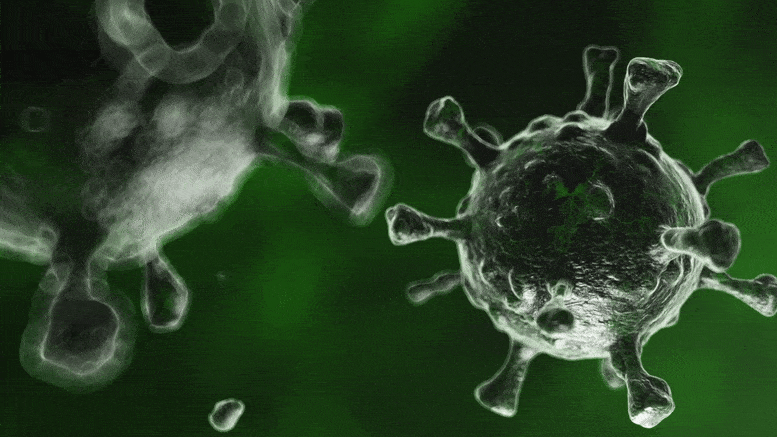
Immunologists from Trinity, who have worked on coronaviruses for the past decade, have just unraveled new secrets behind the viruses’ battle plans – providing new insights into how these deadly viruses sometimes win the war against human immune systems.
The immunologists, led by Dr. Nigel Stevenson, Assistant Professor in Viral Immunology at Trinity, have found how SARS and MERS proteins block the induction of antiviral proteins, which prevents us from mounting a powerful innate immune response against infection.
The coronaviruses SARS and MERS emerged in 2002 and 2012, respectively. Both had higher fatality rates than COVID-19 (around 10% and 40%, respectively), but both infected far fewer people (around 10,000 and 3,000, respectively).
Although different, these two coronaviruses bear many similarities to SARS-COV-2 (COVID-19), and thus drawing up blueprints of their battle plans provides insights with the potential to provide new therapeutic options for treating COVID-19 and future deadly coronaviruses that have yet to emerge.
Interferon Pathway Disruption by Viruses
Dr. Stevenson and his team discovered that SARS and MERS viruses have proteins that essentially throw a spanner in the works of the Interferon antiviral pathway, which — under normal circumstances — activates a cascade of responses in human cells, to produce hundreds of antiviral proteins that block viral replication.
Dr. Nigel Stevenson, Head of the Viral Immunology team in the School of Biochemistry and Immunology, is based in the Trinity Biomedical Sciences Institute (TBSI).
He is the senior author of the research article, which has just been published in the journal Viruses. He said:
“Over time, humans have evolved to fight viral infections by producing molecules called Interferons. When a virus is encountered Interferons are produced, which, in turn, activates an antiviral pathway in our cells that is at the heart of our immediate immune response. The pathway produces specific proteins that switch hundreds of our anti-viral genes on. These genes then produce lots of different antiviral proteins that attack—and in most cases—kill the virus. In doing so, Interferons ‘interfere’ with a virus’ life cycle.”
“However, viruses have also evolved over time to suppress and avoid our immune system responses. And our research aims to understand how viruses suppress the response to Interferons. Our current research has discovered that SARS and MERS prevent key proteins from being activated and entering the nucleus in our cells. The nucleus is where our DNA is stored and where genes are switched on, to generate a proper immune response.
Designing New Therapies to Enhance Immune Response
“The hope is that if we can design new drugs to inhibit the ability of coronaviruses to suppress the Interferon pathway, we should be able to treat people far more effectively. And given the similarity in coronaviruses and their modes of action, such a drug would likely prove effective against all the deadly coronaviruses.”
Dr. Stevenson added:
“Therapeutic Interferon is a drug used to fight certain infections, but it has never proved very effective against coronaviruses. Now we think we know why – if the Interferon pathway is essentially disabled, it can’t stimulate a response.
“If we could restore the natural ability of our immune systems to fight viral infection and prevent viral replication, we could treat infected people with much greater success. In addition, if we could develop a therapeutic that stop viruses from destroying the Interferon pathway, it would in theory open the door to directly attacking the virus.”
Reference: “Inhibition of the IFN-a JAK/STAT Pathway by MERS-CoV and SARS-CoV-1 Proteins in Human Epithelial Cells” by Yamei Zhang, Siobhan Gargan, Fiona M. Roche, Matthew Frieman and Nigel J. Stevenson, 23 March 2022, Viruses.
DOI: 10.3390/v14040667
First author on the research article is Yamei Zhang, who previously spent research time with Dr. Stevenson’s collaborators in Hong Kong University. She and Dr. Stevenson were working on this research before SARS-CoV-2 emerged and the COVID-19 pandemic developed.
The work was funded by Science Foundation Ireland and the China Scholarship Council.
Never miss a breakthrough: Join the SciTechDaily newsletter.
1 Comment
The current understanding is that when coronaviruses are injected into a cell, they’re reproduced in the cell cytoplasm and then try to enter the cell nucleus to help their infection agenda. If the copies can’t get into the nucleus, which is protected by a nuclear membrane, they’re covered with their protein coat and released into the blood stream to find other cells. The big question is how the virus bypasses the nuclear membrane and gets into the cell nucleus.
My independent research has found multiple one-in-a-million nucleotide sequence matches between all the coronaviruses and the human genome. Those sequences are the same as some of the loops of human tRNA. Using those loops and their amino acid code matches, viruses may be able to fool the nuclear membrane in cells to allow the virus to enter and associate with the human DNA, creating more opportunities for further infection. Our immune system may be compromised and may no longer be able to stop the virus and other diseases from attacking organs throughout the body. Only the infection process is considered in my work, not the innate virulence of the virus. Specifics on this can be found by searching YouTube for “Coronavirus – Using Your DNA Against You”